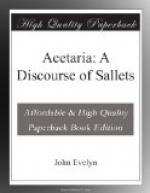To conclude, and after all that has been said of Plants and Salleting, formerly in great esteem, (but since obsolete and quite rejected); What if the exalted Juice of the ancient Silphium should come in, and challenge the Precedency? It is a [43]Plant formerly so highly priz’d, and rare for the richness of its Taste and other Vertues; that as it was dedicated to Apollo, and hung up in his Temple at Delphi; So we read of one single Root brought to the Emperor Nero for an extraordinary Present; and the Drug so esteem’d, that the Romans had long before amass’d a quantity of it, and kept it in the Treasury, till Julius Caesar rob’d it, and took this away, as a thing of mighty value: In a word, it was of that Account; that as a sacred Plant, those of the Cyrenaic Africa, honour’d the very Figure of it, by stamping it on the Reverse of their [44]Coin; and when they would commend a thing for its worth to the Skies, [Greek: Bat-ou silphion], grew into a Proverb: Battus having been the Founder of the City Cyrene, near which it only grew. ’Tis indeed contested among the Learned Botanosophists, whether this Plant was not the same with Laserpitium, and the Laser it yields, the odoriferous [45]_Benzoin_? But doubtless had we the true and genuine Silphium (for it appears to have been often sophisticated, and a spurious sort brought into Italy) it would soon recover its pristine Reputation, and that it was not celebrated so for nothing extraordinary; since bessides its Medicinal Vertue; it was a wonderful Corroborater of the Stomach, a Restorer of lost Appetite, and Masculine Vigour, _&c._ and that they made use of it almost in every thing they eat.
But should we now really tell the World, that this precious Juice is, by many, thought to be no other than the [46]_Faetid Assa_ our nicer Sallet-Eaters (who yet bestow as odious an Epithet on the vulgar Garlick) would cry out upon it as intolerable, and perhaps hardly believe it: But as Aristophanes has brought it in, and sufficiently describ’d it; so the Scholiast upon the place, puts it out of Controversy: And that they made use both of the Leaves, Stalk, (and Extract especially) as we now do Garlick, and other Hautgouts as nauseous altogether. In the mean time, Garcius, Bontius, and others, assure us, that the Indians at this day universally sauce their Viands with it; and the Bramins (who eat no Flesh at all) inrich their Sallets, by constantly rubbing the Dishes with it. Nor are some of our own skilful Cooks Ingnorant, how to condite and use it, with the Applause of those, who, ignorant of the Secret, have admir’d the richness of the Gust it has imparted, when it has been substituted instead of all our Cipollati, and other seasonings of that Nature.




